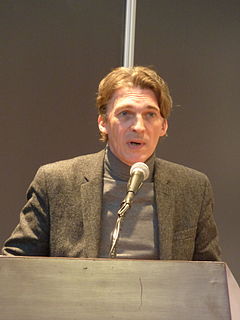Top 194 Modernity Quotes & Sayings - Page 4
Explore popular Modernity quotes.
Last updated on November 20, 2024.
The hope that fuels the pursuit of endless economic growth - that billions of consumers in India & China will one day enjoy the lifestyles of Europeans and Americans - is as absurd & dangerous a fantasy as anything dreamt up by Al-Qaeda. It condemns the global environment to early destruction & looks set to create reservoirs of nihilistic rage & disappointment among hundreds of millions of have-nots - the bitter outcome of the universal triumph of Western Modernity, which turns the revenge of the East into something darkly ambiguous, and all its victories truly Pyrrhic.
Historically, religion has given people another world to live in, a world more adaptive to the human spirit. As a student of world religions, I see religion as the winnower of the wisdom of the human race. Of course, not everything about these religions is wise. Their social patterns, for example - master-slave, caste, and gender relations - have been adopted from the mores of their time. But in their view of the nature of reality, there is nothing in either modernity or postmodernity that rivals them.
For those who do not make the transition to a matured, more spiritual self-will reason will indeed be no more than rationalization. Here is a prodigious parallel: just as in antiquity the dysdaimonic personality could not appreciate how his mentality was bound in by his characterological (banausic, doulic) biases, so in modernity the facile or abstractivist rationalist cannot comprehend how his "rationality" merely slavishly subserves his appetites, delusions, preconceptions, ideologies, etc.
Artists are looking for a new modernity that would be based on translation: What matters today is to translate the cultural values of cultural groups and to connect them to the world network. This “reloading process” of modernism according to the twenty-first-century issues could be called altermodernism, a movement connected to the creolisation of cultures and the fight for autonomy, but also the possibility of producing singularities in a more and more standardized world.
The developed world should neither shelter nor militarily destabilize authoritarian regimes unless those regimes represent an imminent threat to the national security of other states. Developed states should instead work to create the conditions most favorable for a closed regime's safe passage through the least stable segment of the J curve however and whenever the slide toward instability comes. And developed states should minimize the risk these states pose the rest of the world as their transition toward modernity begins.
In "solid modernity" difference was tolerated as a temporary irritant only, expected to disappear tomorrow, when "those aliens" will become like us. "Living with strangers" was therefore not something to last and did not call for developing appropriate arts and skills. Now, however, it looks like that diasporic context of our living will not go away - it will be there forever, so learning how to live with strangers day in, day out without abandoning my own strangeness is high on the agenda.
When the Lilliputians first saw Gulliver's watch, that "wonderful kind of engine...a globe, half silver and half of some transparent metal," they identified it immediately as the god he worshiped. After all, "he seldom did anything without consulting it: he called it his oracle, and said it pointed out the time for every action in his life." To Jonathan Swift in 1726 that was worth a bit of satire. Modernity was under way. We're all Gullivers now. Or are we Yahoos?
Protestant Christianity, whether in its liberal or conservative garb, finds itself waking up each morning in bed with a deteriorating modern culture, between sheets with a raunchy sexual reductionism, despairing scientism, morally normless cultural relativism, and self-assertive individualism. We remain resident aliens, OF the world but not profoundly in it, dining at the banquet table of waning modernity without a whisper of table grace. We all wear biblical name tags (Joseph, David, and Sarah), but have forgotten what our Christian names mean.
We pursue modernity in her incessant metamorphoses yet we never manage to trap her. She always escapes: each encounter ends in flight. We embrace her and she disappears immediately: it was just a little air. It is the instant, that bird that is everywhere and nowhere. We want to trap it alive but it flaps its wings and vanishes in the form of a handful of syllables. We are left empty-handed. Then the doors of perception open slightly and the other time appears, the real one we were searching for without knowing it: the present, the presence.
Modernity is a desert, and we are jungle monkeys. And so new evolutionary selective pressures are coming to bear upon the human situation, new ideas are coming to the fore. Psilocybin is a selective filter for this. The wish to go to space is a selective filter for this. Just the wish to know your own mind is a selective filter for this.
He who sups with the devil had better have a long spoon. The devilry of modernity has its own magic: The [believer] who sups with it will find his spoon getting shorter and shorter--until that last supper in which he is left alone at the table, with no spoon at all and with an empty plate. The devil, one may guess, will by then have gone away to more interesting company.
Readers have no doubt noticed how seldom builders live in houses of their own construction. You will find a town or village expanding in all directions with their masterpieces of modernity in the way of houses and bungalows; but the builder himself you will usually find living nearer the heart of things, snugly and comfortably housed in some more substantial, if less convenient, building of less recent date.
The essence of modernity is that progress no longer waits on genius; instead we have learned to put our faith in the organized efforts of ordinary men. Science is as old as the race, but the effective organization of science is new. Ancient science, like placer mining, was a pursuit of solitary prospectors. Nuggets of truth were found, but the total wealth of knowledge increased slowly. Modern man began to transform this world when he began to mine the hidden veins of knowledge systematically.
Lee was very much his own person so it's impossible to know quite what he would have thought but part of the reason for me staying is that I believe he always wanted this to be a house that would be here forever, that he never wanted his name not to mean anything any more. And I want that too. I want Alexander McQueen to continue. Then, in a hundred years time, there will still be this house that he created, this great place that represents modernity and creativity and beauty and romance and all of those things. That, I think, would be amazing.













